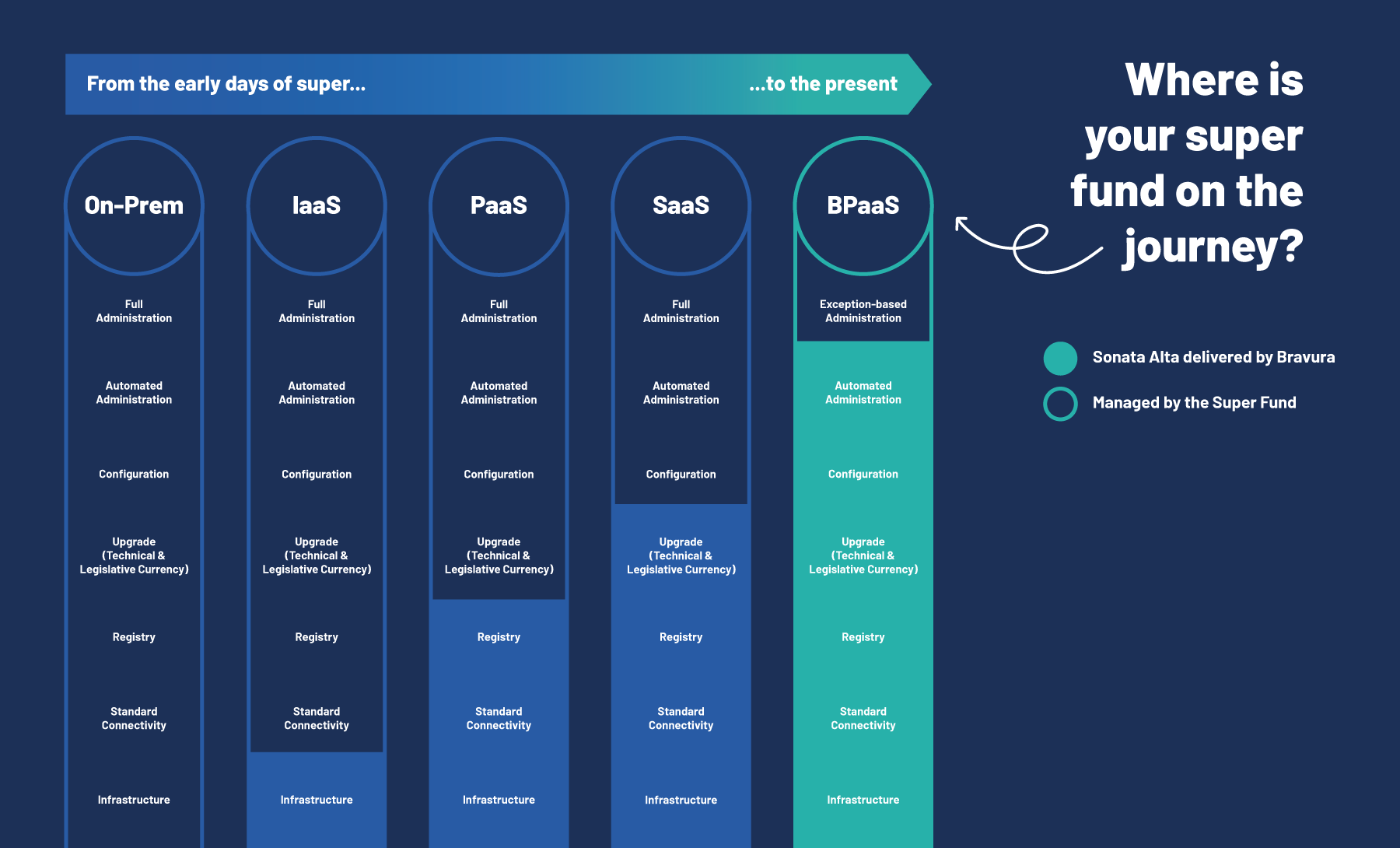Since the inception of the Super Guarantee in 1992, funds have been administered in one of two ways: either through an insourced or an outsourced operating model – with both leveraging technology to support manual processing teams.
The internal path was considered more expensive but gave funds greater control over service levels, while outsourcing generally held the allure of lower upfront costs.
Over the past 30 years technology has evolved to better streamline administration processes through on-premises (On-Prem) or cloud hosted platforms.
And as administration technology continues to advance, funds are increasingly able to automate and digitise their processes using third-party technology, delivered through a secure cloud architecture – also known as Software as a Service (SaaS).
However, as the need for efficient and scalable administration rises, funds are looking for new ways to reduce manual processing and enable digitised member experiences.
Legislation such as the Your Future, Your Super measures, which aim to improve member outcomes, have spurred an increase in fund mergers. Funds are now seeking to achieve the scale needed to drive down administration fees and focusing on investment in digital technology to meet member expectations around the way they engage.
Increasing scale—which allows funds to defray fixed costs across a rising asset and member base—is only one part of the solution. Building a more efficient foundation that can support this scale and underpin day-to-day member services is crucial.
This drive to achieve greater efficiency and scale, as well as improve member personalisation and outcomes has led to the introduction of a Business Process as a Service (BPaaS) operating model for superannuation administration.
The rise of Business Process as a Service (BPaaS)
BPaaS is an evolution from the typical Software as a Service (SaaS) solution in which a fund pays for access to administration software.
Most funds already employ some form of SaaS, where software applications are delivered over the internet, typically on a subscription basis. As businesses have increasingly relied on SaaS applications, they realised the potential for even greater efficiency and cost savings by outsourcing non-core business processes to specialised service providers.
This gave rise to Business Process as a Service – the outsourcing of specific processes to a third-party service provider, which uses technology and expertise to improve the efficiency of those processes. With BPaaS, the vendor provides a highly automated administration solution where the client pays for specific business outcomes rather than access to software.
Essentially, vendors provide the services and also commit to Service Level Agreement (SLA) outcomes – similar to the experience in an outsourced arrangement where a vendor will commit to a percentage of completed tasks in a time frame. An example of this in BPaaS is the delivery of processes such as member onboarding, contribution processing or change of pensioner details – designed for full automation, meaning completion without manual intervention.
These highly automated processes can eliminate the need for human processing of repetitive tasks – human intervention is only required by exception when a task is flagged as needing an additional check or for a ‘moment that matters’.
The vendor also maintains legislative currency of the solution, so that clients benefit from the expertise and improvements developed over time through the scale and reach of the vendor.

The evolution of administration by Bravura Solutions Limited.
Benefits of a BPaaS model
Switching to a technology enabled BPaaS approach can provide several benefits, including:
- Increased efficiency: Technology can automate repetitive tasks and process large amounts of data quickly and accurately, reducing errors and increasing productivity. Processes are automated and follow pre-defined workflows, meaning transactions are pre-validated which reduces touch points and processing time.
- Cost savings: Outsourcing manual tasks to technology can reduce labour costs, and a cloud service eliminates the need to implement and manage expensive equipment and infrastructure. Standard operating models employed by the service provider remove the need to develop and maintain a bespoke solution.
- Scalability: Technology is better equipped to handle fluctuating workloads and offers super funds close to infinite scalability.
- Improved data quality: Automated systems can ensure consistency and accuracy of data and reduce the risk of human error by completely removing the need for human involvement at certain steps, and flagging issues as they arise where human processing is required.
- Increased speed and flexibility: Automated systems can process information faster and respond to changing business needs more quickly than manual processes, which can be inflexible or require lengthy change management processes to implement.
- Better compliance: Automated systems can ensure compliance processes are followed and tracked, ensuring robust management and reporting, and the service provider manages the task of keeping the solution aligned to legislative changes.
- Stronger security: Automated systems can provide better security for sensitive information, as they can be programmed to comply with data privacy and security regulations – reducing the number of human touchpoints required to process sensitive data.
Funds are already starting to reap the benefits of adopting a BPaaS approach. For example, one fund saw over a two-month period, the majority of completed financial hardship claims processed within three days – previously taking up to three weeks.
About half of all paperwork submitted by members previously needed more information before it could be processed. Information is now automatically pre-validated when members submit their requests digitally – significantly reducing rework and call centre enquiries.
Members and fund staff can view the status of a transaction through an activity tracker, providing real-time visibility for everyone involved in the process, and better service for the member.
The ability to deliver these types of mass commoditised processes faster, better and at lower cost allows funds to focus on services that differentiate them from competitors.
Focus on moments that matter
Technology-enabled administration provides a stronger service foundation for funds by enabling exception-based processing – improving speed of service and freeing their resources to focus on the deeper ‘moments that matter’ for members.
There are many ways that funds can cement their relationship with members through more engaging interactions amid an environment of rising competition between funds. These typically include providing more interactive digital tools or expanding the reach of advice services.
Funds also need to find new ways to bolster retirement incomes (beyond new products) since the introduction of the Retirement Income Covenant. For example, a rising number of funds are now integrating end-to-end digital financial advice into their operating model.This ultimately streamlines the advice process by pre-populating advice fields, while making record keeping simple and enabling straight-through processing of investment changes.
There is still a worl
d of innovation to be explored within the confines of the legislative framework. Scalable and efficient administration enabled by technology is key to powering this innovation because it enables funds to form a broader eco-system of digital services to support retirement – particularly as advice regulations streamline.
Australia’s ageing population means a rising number of people will increasingly be drawing down their retirement savings and interacting more with their funds through different channels. It’s never been more important to build the foundation that creates the retirement they want.
To learn more about Bravura’s BPaaS offering Sonata Alta, visit bravurasolutions.com or email contactus@bravurasolutions.com.
Bravura is exhibiting at the ASFA Conference 21-23 February in Brisbane, so please visit in the Super Expo..









